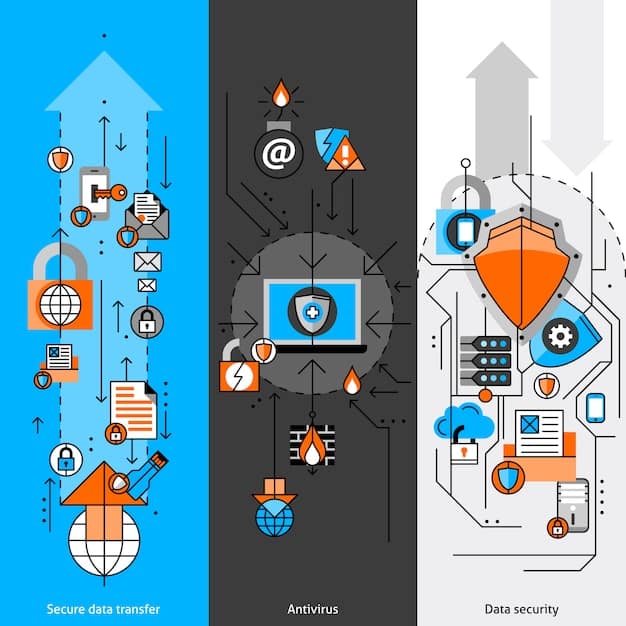Personalized Medicine: Genetic Sequencing Tailoring Treatments by 2035

Personalized medicine, driven by advancements in genetic sequencing, is poised to revolutionize healthcare in the US, with projections indicating that tailored treatments could reach 75% of patients by 2035, offering improved outcomes and reduced side effects.
Imagine a future where medical treatments are precisely tailored to your unique genetic makeup. This is the promise of personalized medicine: How Genetic Sequencing Will Tailor Treatments for 75% of US Patients by 2035?, a groundbreaking approach poised to transform healthcare as we know it.
The Dawn of Personalized Medicine
Personalized medicine is no longer a futuristic concept; it’s rapidly becoming a reality. This innovative approach leverages an individual’s genetic information to guide decisions about prevention, diagnosis, and treatment of diseases. With advancements in genetic sequencing technologies, the potential for tailored healthcare is expanding exponentially.

The core principle of personalized medicine is recognizing that “one size fits all” approaches to healthcare are often inadequate. Each individual’s genetic makeup, lifestyle, and environment contribute to their unique health profile. By understanding these factors, healthcare providers can develop more effective and targeted interventions.
Genetic Sequencing: The Key Enabler
Genetic sequencing plays a pivotal role in personalized medicine. It involves analyzing an individual’s DNA to identify specific genetic variations that may influence their risk of developing certain diseases or their response to particular medications.
Benefits of Personalized Medicine
Personalized medicine offers a multitude of potential benefits for patients and healthcare providers. These include more accurate diagnoses, more effective treatment plans, reduced side effects, and improved overall health outcomes.
- More precise diagnoses based on individual genetic profiles.
- Targeted treatments designed to maximize effectiveness while minimizing adverse effects.
- Proactive prevention strategies based on identified genetic predispositions.
- Enhanced patient engagement and empowerment through a better understanding of their own health.
In conclusion, personalized medicine represents a paradigm shift in healthcare, moving away from generalized approaches and towards individualized, data-driven strategies. By leveraging the power of genetic sequencing and other advanced technologies, personalized medicine has the potential to improve the health and well-being of individuals across the US.
The Role of Genetic Sequencing in Personalized Treatment Plans
Genetic sequencing forms the bedrock of personalized treatment plans, enabling healthcare providers to gain unprecedented insights into a patient’s unique biological makeup. This detailed understanding allows for the development of targeted therapies that are more effective and less likely to cause adverse reactions.
By analyzing an individual’s DNA, genetic sequencing can identify specific genetic variations that influence drug metabolism, disease susceptibility, and treatment response. This information can then be used to guide treatment decisions and optimize patient outcomes.
Pharmacogenomics: Tailoring Drug Therapy
Pharmacogenomics is a key area of personalized medicine that focuses on how genes affect a person’s response to drugs. Genetic variations can influence how quickly or slowly a person metabolizes a drug, which can impact its effectiveness and the risk of side effects.
Cancer Treatment: A Prime Example
Personalized treatment plans are particularly valuable in cancer care. Genetic sequencing can identify specific mutations driving tumor growth, allowing oncologists to select targeted therapies that specifically attack these mutations.
- Identifying genetic mutations that drive tumor growth.
- Selecting targeted therapies that specifically attack these mutations.
- Predicting a patient’s response to chemotherapy or other cancer treatments.
- Monitoring treatment effectiveness and detecting resistance early on.
Ultimately, genetic sequencing is revolutionizing personalized treatment plans by providing healthcare providers with the information they need to make more informed decisions and deliver more effective care. This leads to better patient outcomes, reduced side effects, and improved quality of life.
Projected Impact: 75% of US Patients by 2035
Experts predict that personalized medicine will become increasingly prevalent in the coming years, with the potential to impact a large portion of the US population. By 2035, it is estimated that personalized treatments, guided by genetic sequencing, could be tailored for as many as 75% of US patients.
This projection is based on several factors, including the decreasing cost of genetic sequencing, the increasing availability of genetic testing services, and the growing awareness among healthcare providers and patients about the benefits of personalized medicine.
Driving Forces Behind the Growth
Several key factors are driving the growth of personalized medicine in the US. These include advancements in technology, increasing research funding, and growing consumer demand for more personalized healthcare.
The decreasing cost of genetic sequencing is making it more accessible to a wider range of patients. As the price continues to decline, it is expected that genetic testing will become a routine part of healthcare.
- Decreasing cost of genetic sequencing, making it more accessible to a wider range of patients.
- Increasing availability of genetic testing services, both in clinical and direct-to-consumer settings.
- Growing awareness among healthcare providers and patients about the benefits of personalized medicine.
- Increasing research funding from government agencies, foundations, and private companies.
In conclusion, the projected impact of personalized medicine on US patients by 2035 is significant. With continued advancements in technology and increasing adoption by healthcare providers, personalized medicine has the potential to transform healthcare and improve the lives of millions of Americans.
Challenges and Opportunities in Implementing Personalized Medicine
While personalized medicine holds immense promise, its widespread implementation faces several challenges. Addressing these challenges is crucial to realizing the full potential of personalized medicine and ensuring that it benefits all patients.

One of the key challenges is the need for robust data infrastructure to manage and analyze the vast amounts of genetic and clinical data generated by personalized medicine approaches. This requires the development of secure and interoperable systems that can share data across different healthcare settings.
Data Privacy and Security
Protecting patient data privacy and security is paramount in personalized medicine. Genetic information is highly sensitive and must be safeguarded against unauthorized access and misuse.
Ethical Considerations
Personalized medicine raises several ethical considerations, including the potential for genetic discrimination, the need for informed consent, and the equitable access to personalized treatments.
- Developing robust data infrastructure to manage and analyze genetic and clinical data.
- Addressing data privacy and security concerns to protect patient information.
- Resolving ethical considerations related to genetic discrimination and informed consent.
- Ensuring equitable access to personalized treatments for all patients.
By proactively addressing these challenges, we can pave the way for the successful implementation of personalized medicine and ensure that it benefits all members of society.
The Economic Implications of Personalized Medicine
Personalized medicine has significant economic implications for the healthcare system. While the initial investment in genetic sequencing and personalized treatments may be higher, the long-term cost savings could be substantial.
By targeting treatments to specific individuals based on their genetic profiles, personalized medicine can reduce the likelihood of ineffective treatments and adverse drug reactions, leading to lower healthcare costs overall.
Reducing Healthcare Costs
Personalized medicine has the potential to reduce healthcare costs by preventing unnecessary treatments, lowering hospitalization rates, and improving patient outcomes.
Driving Innovation and Economic Growth
The development and implementation of personalized medicine technologies are spurring innovation and economic growth in the healthcare industry. This is creating new jobs and opportunities in areas such as genetic sequencing, bioinformatics, and personalized drug development.
- Reducing healthcare costs by preventing unnecessary treatments and adverse drug reactions.
- Improving patient outcomes and reducing hospitalization rates.
- Driving innovation and economic growth in the healthcare industry.
- Creating new jobs and opportunities in genetic sequencing, bioinformatics, and personalized drug development.
The economic implications of personalized medicine are far-reaching and positive. By embracing this innovative approach, we can create a more efficient, effective, and sustainable healthcare system for the future.
Preparing for the Future of Healthcare with Personalized Medicine
As personalized medicine continues to evolve, it is essential to prepare for the future of healthcare by investing in research, education, and infrastructure. This includes supporting the development of new technologies, training healthcare professionals in personalized medicine approaches, and establishing clear regulatory guidelines.
Investing in research will help to further our understanding of the human genome and identify new genetic targets for personalized treatments. Education is crucial to ensure that healthcare professionals have the knowledge and skills to effectively integrate personalized medicine into their practice.
Investing in Research and Development
Continued investment in research and development is essential to advance the field of personalized medicine and unlock its full potential.
Educating Healthcare Professionals
Healthcare professionals need to be trained in personalized medicine approaches so they can effectively integrate genetic information into their clinical decision-making.
- Investing in research and development to advance the field of personalized medicine.
- Educating healthcare professionals in personalized medicine approaches.
- Establishing clear regulatory guidelines for genetic testing and personalized treatments.
- Promoting public awareness and understanding of personalized medicine.
Preparing for the future of healthcare with personalized medicine requires a collaborative effort between researchers, healthcare providers, policymakers, and patients. By working together, we can ensure that personalized medicine is implemented safely, effectively, and equitably.
| Key Point | Brief Description |
|---|---|
| 🧬 Genetic Sequencing | Analyzes DNA to tailor treatments based on individual genetic profiles. |
| 🎯 Personalized Treatment | Customized medical plans based on a patient’s unique genetic makeup. |
| 💰 Economic Impact | Potential for long-term cost savings by reducing ineffective treatments. |
| 📈 Future Trends | Projected to impact 75% of US patients by 2035 with tailored treatments. |
FAQ
▼
Personalized medicine is a healthcare approach that uses an individual’s genetic, lifestyle, and environmental information to tailor prevention, diagnosis, and treatment strategies.
▼
Genetic sequencing analyzes an individual’s DNA to identify variations affecting disease risk and drug response, enabling targeted therapies and improved outcomes.
▼
Benefits include more accurate diagnoses, effective treatments, reduced side effects, proactive prevention, and enhanced patient engagement in their healthcare journey.
▼
Challenges include managing vast data, ensuring data privacy, addressing ethical concerns like genetic discrimination, and ensuring equitable access to personalized treatments.
▼
Personalized medicine can reduce costs by preventing unnecessary treatments, lowering hospitalization rates, improving patient outcomes, and driving innovation in personalized drug development.
Conclusion
As we journey towards 2035, it’s clear that personalized medicine, powered by genetic sequencing, is set to redefine healthcare in the US. While challenges remain, the potential for tailored treatments to benefit a significant portion of the population is undeniable, promising a future where healthcare is more precise, effective, and patient-centered.





